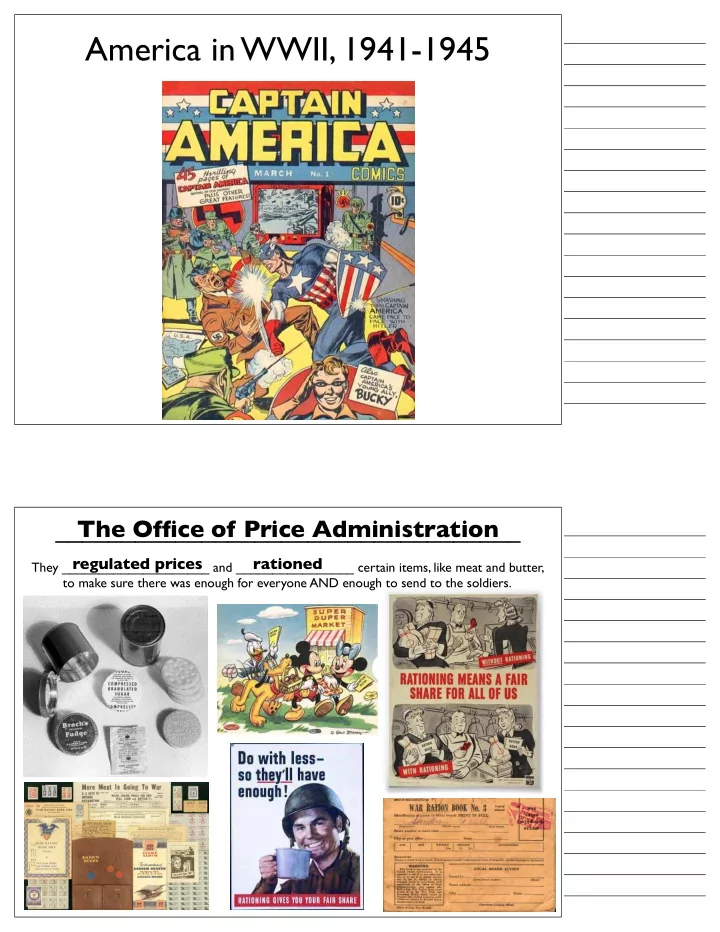

America in WWII, 1941-1945 The Office of Price Administration ___________________________________ regulated prices rationed They ____________________ and ________________ certain items, like meat and butter, to make sure there was enough for everyone AND enough to send to the soldiers.
The War Production Board ___________________________________ industry took control of _____________ and halted production of non- essential items (like washing machines and passenger cars) “Rosie the Riveter” ___________________________________ The War Labor Board set ceilings on wages (lower wages means lower prices)
Minority Groups African-Americans Fight For The “Double V” Bracero Program _______________________ Code Talkers _______________________ Zoot Suits Japanese-American Internment (1942) 127,000 _______________ Japanese Americans lived in the US at the time of the Pearl Harbor attack 112,000 resided on the West Coast nisei sansei most were __________ (second generation) or __________ (third generation) afraid the Japanese-Americans would becomes spies for Japan, Executive Order 9066 the US government passed _____________________________, authorizing the War Department to construct detention camps to hold people of Japanese ancestry 122,000 nearly _______________ men, women, and children on the west coast were relocated across the country and held in internment camps __________ Manzanar The site of one of ten camps where over 110,000 Japanese Americans were incarcerated during World War II. Located at the foot of the Sierra Nevada in California, it is approximately 230 miles northeast of Los Angeles Approximately 14,500 people of German and Italian ancestry and 2,200 ethnic Japanese deported from Latin American countries were also subject to the wartime confinement program.
Internment Camp Locations European Axis Leadership Benito Mussolini Duce of Fascism Adolf Hitler (Italy) Führer of Germany December 24, 1925 –July 25, 1943 April 20, 1889 – April 30, 1945
Allied Leaders Sir Winston Churchill ________________________ Franklin D. Roosevelt Prime Minister of President of the US the United Kingdom Joseph Stalin ______________ General Secretary of the Communist Party of the Soviet Union ________________________ General Dwight Eisenhower 1st Supreme Allied Commander Europe Eisenhower with U.S. paratroopers of the 502d Parachute Infantry Regiment, 101st Airborne Division on June 5, 1944 British Field Marshal Bernard ________________ Montgomery ________________ nicknamed "Monty"
Halting Hitler’s Advance German u-boats traveled in what they called wolfpacks “_____________” able to locate and destroy British and American vessels enigma code the German "________________" was broken decoded messages helped the Allies locate German u-boat wolfpacks Erwin Rommel German Gen. ___________________ Desert Fox nicknamed the "______________" because he was so clever won many battles in North Africa Suez Canal wanted to capture the _____________ in Egypt (this would link Italy and Germany to Japan through the Mediterranean and the Indian & Pacific Oceans) Stalingrad the Battle of _____________ (Sep. 1942) Soviets stopped the German eastward advance El Alamein the Battle of ________________ (Oct. 1942) Brit. Gen. Bernard Montgomery stopped the Germans in Egypt The Fighting Continues the Soviet Union wanted the Allies to open a second front _______________ against Germany Russia had been paying a heavy share of the fighting (20 million Russians would die by the end of the war) America wanted to attack the Nazis through France Britain wanted to lure the war away from England Winston Churchill suggested they hit Germany's "soft underbelly" from North Africa up through Italy Gen. Eisenhower attacked North Africa (Nov. 1942) Casablanca Conference ____________________________ (Jan. 1943) Roosevelt and Churchill agreed to seek the unconditional surrender "____________________________________" of Germany Germans were pushed out of Africa (May 1943) Allies moved across North Africa and up to Sicily Mussolini overthrown; Italy surrenders (Sept. 1943) Tehran Conference the ________________________, November-December 1943 Joseph Stalin, Franklin D. Roosevelt, and Winston Churchill met in Tehran, Iran Britain and the US agreed to the open a second front against Nazi Germany
The Second Front D-Day, June 6, 1944
Recommend
More recommend